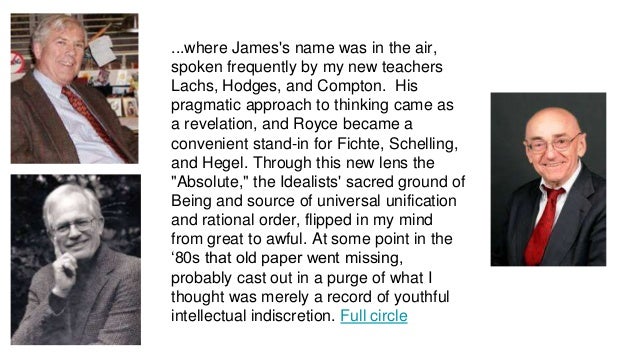And how gratifying, at the conference, to get to acknowledge the positive impact on my life of my old Vandy grad school teachers with two of them (Lachs and Hodges) in the room, and a third (Compton) there in spirit. (I should also note John Post's flattering footnote citation as a major early validation and encouragement.) Slide #13:

And this happened: a man introducing himself as Evan said he'd taken my Meaning of Life course at Vandy a decade and a half ago, changed his major to Philosophy in consequence, and was now in town from New York just to enjoy the show. That's doubly gratifying. We're more likely to hear from the complainers, most of the time.
And, I got to share one of my old Best Man's best lines. He used to work in a factory, where a cohort would sometimes say something like "Hey Asshole, hand me that hammer!" On the day my friend was awarded his PhD (for his work on Kant, btw), he announced that from now on the appropriate response would be: "That's Dr. Asshole to you!"
That got the laugh it deserved, and broke the lingering tension after Scott Aikin opened the session with a thrown gauntlet retrieved during Q-&-A by Randy Auxier: "Call me an analytic asshole, I'm a big boy, I can take it." Randy and Scott reconciled eventually, with Randy's passive-aggressive concession: "best irrelevant analysis of William James's will to believe I've ever heard."
I for one do not enjoy the pugilistic style of winner-take-all confrontational discourse still favored by too many philosophers, redolent of the trash-talking polarized politics we sadly seem to be coming to accept as the new norm. John Lachs long ago took a public stand against that style of philosophizing, when he founded the Society for the Advancement of American Philosophy (SAAP) as a deliberate alternative to the cutthroat aggressions then common at meetings of the American Philosophical Association (APA).
But, some of my best friends are analytic assholes. ("Royce. Woo hoo!" texted one of them yesterday). They have their redeeming qualities and saving aspects. Mostly they don't take or intend the pugilism personally, it's just sport for them... in service of the pursuit of truth. There's more than one way to be a good philosopher. I don't disagree with Scott's assertion that good philosophers study logic, I'd just add that really good philosophers leaven their logic with humane charity and what Lachs in the Q-&-A called a sense of "pity" which, if it is indeed something like empathy and compassion, the world could sure use a lot more of.)
Scott's partner in style and substance Robert Talisse, our recent Lyceum guest, has had more than his share of verbal bouts in the philosophy ring, in print and lecture halls and online. And now he's written a whole book urging a more civil style of public intercourse. It's a good prescription, a solid analysis.
An old post. Anthony Trollope said “A small daily task, if it be really daily, will beat the labours of a spasmodic Hercules.” Here we go.
Today's small task in CoPhi is to introduce three gallic wits of half a millennium ago whose preoccupations have barely aged: Rene Descartes, Michel Montaigne (the anti-Descartes who preceded him), and Blaise Pascal. Of the three, Montaigne the peripatetic skeptic essayist, is most to my taste. I so envy his book-lined tower, and his pluck in inventing the personal essay.
From the windows on the top floor he had a commanding view of the estate and could give orders and instructions to the estate workers. As he walked around the Tower he could see above him painted on the beams favorite quotes (mainly in Latin, but some in Greek) from his favorite Classical writers; Also as he walked, thought and dictated he would stop and consult his books to check a quote or story... Reading the world – visiting Montaigne’s Tower
The quotable essayist:
- “On the highest throne in the world, we still sit only on our own bottom.”
- “I quote others only in order the better to express myself.”
- “When I am attacked by gloomy thoughts, nothing helps me so much as running to my books. They quickly absorb me and banish the clouds from my mind.”
- “Nothing is so firmly believed as that which we least know.”
- “To begin depriving death of its greatest advantage over us, let us adopt a way clean contrary to that common one; let us deprive death of its strangeness, let us frequent it, let us get used to it; let us have nothing more often in mind than death... We do not know where death awaits us: so let us wait for it everywhere."
- "To practice death is to practice freedom. A man who has learned how to die has unlearned how to be a slave.”
- “There were many terrible things in my life and most of them never happened.”
- “When I dance, I dance; when I sleep, I sleep; yes, and when I walk alone in a beautiful orchard, if my thoughts drift to far-off matters for some part of the time for some other part I lead them back again to the walk, the orchard, to the sweetness of this solitude, to myself.”
- “He who establishes his argument by noise and command, shows that his reason is weak.”
- “Not being able to govern events, I govern myself”
- “The thing I fear most is fear.”
- “Saying is one thing and doing is another”
- “There is no knowledge so hard to acquire as the knowledge of how to live this life well and naturally.”
- “Que sçais-je?" (What do I know?)”
No comments:
Post a Comment